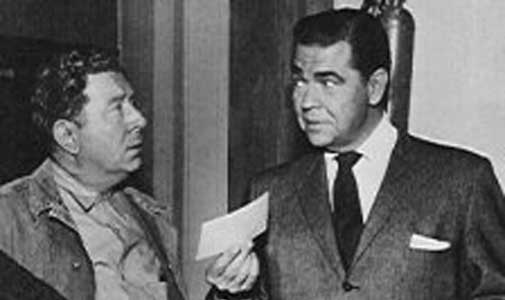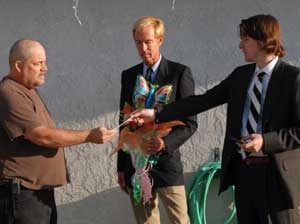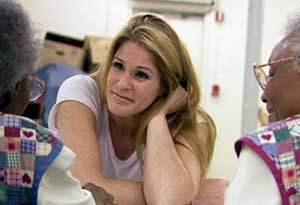
When I saw the trailer for ABC's Secret Millionaire, which premieres Sunday night at 8 ET, I immediately thought of John Beresford Tipton. Those of us of a certain vintage will recall the late-1950s TV series The Millionaire, about an industrialist as shadowy as James Bond's foes, who, through a stolid intermediary, "Michael Anthony" (played by Marvin Miller), handed over a check for $1 million to an unwitting stranger.
We watched to see how the lucky millionaires reacted, at the moment of gifting, and how it changed their lives thereafter. And to wonder: What if it happened to me?! Many viewers didn't know, or care, that Tipton -- and his money -- were fictions.
Brilliant, I thought. Networks now regularly dole out a million bucks a pop on game shows, or at least the promise of it. ABC, with its new effort, has simply outsourced the prize money!
For each episode of Secret Millionaire, a mega-rich person will go undercover (a la CBS's new Undercover Boss [which I wrote about on this website HERE]), scout among worthy causes, and fork over a Tiptonian million at the end of each episode.
Girl, was I off.
Secret Millionaire is not a retreaded, albeit non-fiction, version of The Millionaire. It is, instead, two other shows: one a moving documentary about poverty in America, the other a maudlin tearfest.

In the first half-hour, we meet our Mr. or Ms. Moneybags. After this petit Lifestyles of the Rich and Famous-like segment ("I not only have one house on the beach, I have two houses on the beach!"), our millionaire is transported into one of the nation's urban hellholes -- Detroit, say, with its 35,000 hollowed-out dwellings and one murder per day; or Western Heights, Tennessee, outside Knoxville.
She or he is then issued a clunker car, a lousy (and lousey) apartment, and $40 to $50 a week for food and other essentials -- the cash equivalent, we are told, of local welfare or food stamp allotments. Our slum tourists go grocery shopping, once, and that takes care of that. Soon, one is suppering on popcorn.
Good thing this descent into poverty is slated to last only six days. In that time frame, no need to refill the car's gas tank, buy clothes, or see a doctor. A full hour of "America on $6 or $7 a Day" would have been harrowingly potent; viewers would have scattered like cockroaches on the linoleum.
The creators of Secret Millionaire, in some sense to their credit, move on, rather than playing shock and gross-out with our pampered protagonists in a kind of class-based version of Wife Swap. Instead, we take to the streets for what is the most interesting and revealing segment of the show.
The post-apocalyptic urban landscape of burned-out houses, hollowed-out economies, and the evening cricket-song of drug shootouts is always arresting, so to speak. But even more arresting is the array of voluntary organizations toiling with their fingers in the dike.
-- "Special Spaces" refurbishes the bedrooms of gravely ill children.
-- "Joy of Music" donates free musical instruments and lessons for poor kids, some of whom emerge as prodigies.
-- "Young Detroit Builders" has refurbished or erected 800 homes for the poor. (Beyond the obvious benefit, it gives young people employable skills in the building crafts.)
-- "Be a Man" volunteers patrol a Detroit free-fire zone, Guardian Angel-style.
-- "Really Living" drives sick folks to the doctor and provides other help for the homebound. It was at that point I thought, oh, dear, what government agency does that?
-- There's even a conventional soup kitchen, "Love Kitchen," less conventional for being run by the sweetest and most generous African-American 82-year-old twin sisters, named Helen and Ellen, you will ever meet.

Thank you, dear benefactors, for not choosing from among the three organizations and one needy family you visited undercover for your financial largess. Thank you for giving to each of them, in varying amounts. The poor already play Survivor every day.
But those amounts? Spoiler alert -- or, rather, I'll just say that this show needs to find either richer people or those more willing to dig deeper for a full hour of primetime hero-worship.
These first two millionaires are likeable folks -- don't get me wrong. I'm betting, though, that their tax-bracket cousins give similar or much greater amounts every year to charity as a matter of course, if only for tax deductions. I suppose it is good to have these guys doing it on TV. Their money helps these good people, their organizations, their communities, and maybe their donations will shame others into action.
But tomorrow and tomorrow and tomorrow, after we go to bed feeling good about these saints and their new benefactors, Detroit will still be Detroit.

Second half-hour, time to shut off the set. Unless you want to watch Dani Johnson -- who catapulted from welfare to millionairess in TWO years by launching a business from the trunk of her car (happens all the time in America, right?) -- cry from her flashbacks of previous destitution.
Or the volunteers cry as they tell their personal stories.
Or everyone cry when the secret millionaires show up for a second day on the job.
Two days -- wow!
Or everyone cry because everyone else is crying, like some kind of contagion of witch possessions in the nunnery.
And at the moment of giving, well -- well, you can imagine.
These climactic scenes made me feel oddly squirrelly, like the moment of truth in Undercover Boss. Wait, you're not really who you said you were? And there is something simultaneously beautiful and unnerving about giving to those who cannot reciprocate.
Philanthropy in America, notes the editor of a three-volume study of the same name (Dwight Burlingame, ed., Philanthropy in America: A Comprehensive Historical Encyclopedia) "is very much a story about the interests of others as well as self-interests."
Whether motivated by self-interest or genuine altruism (the latter a surprisingly slippery phenomenon to authenticate -- see Elliott Sober and David Sloan Wilson, Unto Others: The Evolution and Psychology of Unselfish Behavior [1998]), this new breed of tele-philanthropists has paid relatively little for an emotional rush, its life-long comet tail, and forty-seven minutes of fame.
And, of course, these secret millionaires' very public exposure on television isn't exactly going to hurt sales for their firms.
Two ideas. First, if this show survives, turn it into Secret Billionaire. There are scads of them now, and last year, according to The Chronicle of Philanthropy, they gave away less than in recent memory.
You want your hour in the spotlight, Richie Rich, you fork over a million bucks.
Second, how about giving the prize money from every game show to charity, whether or not a "celebrity" is playing? Again, a million bucks a pop, in some cases.
Like Tipton, only with real dough.